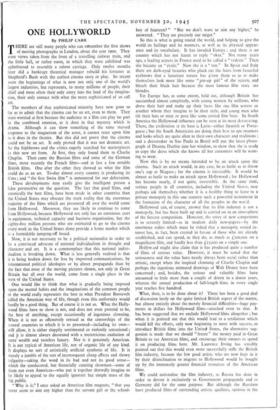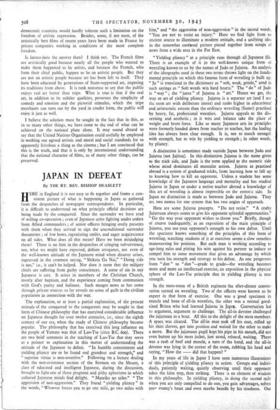ONE HOLLYWORLD
By PHILIP CARR
THERE are still many people who can remember the first shows of moving photographs in London, about the year 1900. They were views taken from the front of a travelling railway train, and the little hall, or rather room, in which they were exhibited was upholstered to resemble a saloon carriage. Only twelve months later did a bankrupt theatrical manager rebuild his fortunes at Shepherd's Bush with the earliest cinema story or play. So recent were the beginnings of what is now not only one of the world's largest industries, but represents, to many millions of people, their chief and most often their only entry into the land of the imagina- tion, their only contact with what the more sophisticated of us call art.
The members of that sophisticated minority have now gone so far as to admit that the cinema can be an art, even to them. They were worried at first because the audience at a film can play no part in the combined emotion, as it does in that mystery which is drama. Although it can show something of the same massed response to the magnetism of the actor, it cannot react upon him as it does in the theatre. But this did not prove that the cinema could not be an art. It only proved that it was not dramatic art. So the highbrows and the critics eagerly searched for masterpieces in this new art form. At first, they only found them in Charlie Chaplin. Then came the Russian films and some of the German films, more recently the French films—and at last a few notable British films. One after the other they showed us what the film could do as an art. To-day almost every country is producing its fi!ms ; and "the first Swiss film" is announced for our delectation.
These developments may easily give the intelligent person a false perspective on the question. The fact that good films, and artistically the best films, have been made in other countries than the United States may obscure the stark reality that the enormous majority of the films which are presented all over the world come from Hollywood. Moreover, they are likely to continue to come from Hollywood, because Hollywood not only has an enormous start in equipment, technical capacity and business organisation, but the eighty-five million persons who are estimated to go to the cinema every week in the United States alone provide a home market which is a formidable jumping-off board.
Now, it is not necessary to be a political nationalist in order to be a convinced advocate of national individualism in thought and character and art. It is a commonplace that this national indivi- dualism is breaking down. What is less generally realised is that it is being broken down far less by improved communications, by international political ideologies or by direct propaganda than by the fact that most of the moving pictures shown, not only in Great Britain but all over the world, come from a single place in the west of the United States.
One would like to think that what is gradually being imposed
upon the mental habits and the imaginations of the common people of the world really, represents the best in what President Roosevelt called the American way of life, though even this uniformity would hardly be a good thing. But of course it is not so. What the Holly- wood films have to show is not, and does not even pretend to be, the best of anything, except occasionally of ingenious clowning. When it is not as offensively sensual as the censorships of the several countries to which it is to presented—including its own— will allow, it is either sloppily sentimental or violently sensational ; and it is almost always decorated with a meretricious exaltation of mere wealth and tasteless luxury. Nor is it genuinely American. It is not typical of American life, nor of organic life of any kind. It displays no sort of artistically artificial synthesis of life. It is merely a jumble of the sort of inconsequent cheap effects and showy vulgarity—taking the word in its bad and not its good sense— which the uneducated, but financially cunning showmen—some of them not even American—who put it together shrewdly imagine to be likely to appeal to the equally ignorant but simple mass of the big public.
"Why is it," I once asked an American film magnate, "that you lever seem to aim any higher than the servant girl or the school-
boy of foutteen? " "But we don't want to aim any higher," he answered. "They are precisely our target."
So this is what is going round the world, and helping to give the world its feelings and its manners, as well as its physical appear- ance and its vocabulary. It has invaded Europe ; and there is no country which has not learnt to reply "okay." Not many years ago, a leading actress in France used to be called a "vedette." Then she became an " etoile." Now she is a "star." In Spain and Italy there are dark-eyed beauties who pluck out the hairs from beautiful eyebrows that a luxuriant nature has given them so as to make themselves look more like some "yin-up girl" of the screen, and bleach their black hair because the most famous film stars are blondes.
Yet Europe has, to some extent, held out, although Britain has succumbed almost completely, with young women by millions, who dress their hair and make up their faces like one film actress or another whom they imagine to be their style, and young men who tilt their hats or strut or pose like some envied film hero. In South America the Hollywood influence can be seen at its most devastating. There, the civilisation at its base is Latin—either Spanish or Portu- guese; but the South Americans are doing their best to ape manners and looks which are quite alien to their own character and traditions ; and a dressmaker in Sao Paulo in Brazil will put the latest photo- graph of Deanna Durbin into her window, to show that she is ready to copy the dress which she knows all her customers will be want- ing to wear.
Now this is by no means intended to be an attack upon the cinema. Such an attack would, in any case, be as futile as to throw one's cap at Niagara ; for the cinema is irresistible. It would be almost as futile to make an attack upon Hollywood ; for Hollywood has become nearly, if not quite, irresistible. At the Same tittle, serious people in all countries, including the United States, may perhaps ask themselves whether it is a healthy thing to leave to a private monopoly in this one country such a powerful instrument in the formation of the character of all the peoples in the work!.
Hollywood can, of course, answer that its film industry is not a monopoly, but has been built up and is carried on in an atmosphere of the fiercest competition. However, the entry of new competitors is so severely .limited—as in modern daily newspapers—by the enormous stakes which must be risked that a monopoly vested in- terest has, in fact, been created in favour of those who are already established, and can spend, as they do, as much as f.soo,000 on a magnificent film, and hardly less than £15,000 on a simple one.
HollywJod might also claim that it has produced quite a number of films of serious value. However, it must be noted that the seriousness and the value have nearly always been social rather than artistic, except when the inspired clowning of Charlie Chaplin and perhaps the ingenious animated drawings of Walt Disney have been concerned ; and, besides, the serious and valuable films have amounted to little more than a couple of dozen in a dozen years, whereas the annual production of full-length films in every single year reaches five hundred.
What, then, is to be done about it? There has been a good deal of discussion lately on the quite limited British aspect of the matter, but almost entirely about the merely financial difficulties—huge pay- ments in dollars for Hollywood films—attached even to that. It has been suggested that we exclude Hollywood films altogether ; but when it is pointed out that this would lead to a retaliation which would kill the efforts, only now beginning to meet with success, to introduce British films into the United States, the alternative sug- gestion is made that we should "freeze" the money paid in Great Britain to see American films, and encourage their owners to spend it on producing films here. Mr. Laurence Irving has sensibly pointed out that this would even more successfully stifle the British film industry, because the few good artists who are now kept in it by their disinclination to migrate to Hollywood would be bought up by the immensely greater financial resources of the American films.
We could nationalise the film industry, as Russia has done in order to devote it exclusively to Government propaganda and as Germany did for the same purpose. But although the Russians have produced films of outstanding artistic qualities, opinion in the democratic countries would hardly tolerate such a limitation on the freedom of artistic expression. Besides, some, if not most, of the artistically best films of recent years have been made in France by private companies working in conditions of the most complete freedom.
Is laissez-faire the answer then? I think not. The French films are artistically good because nearly all the people who wanted to make them happened to be artists, and because the French, who form their chief public, happen to be an artistic people. But they are not an artistic people because art has been left to itself. They have been educated by generations of State-supported art, imposing its traditions from above. It is rank nonsense to say that the public enjoys real art better than tripe. What is true is that if the real art, in addition to its subtler qualities, possesses the simplicity of comedy and emotion and the pictorial stimulus, which the tripe merchants can turn out by the yard in cruder form, the public will enjoy it just as well.
I believe the solution must be sought in the fact that in this, as in so many other things, we have come to the end of what can be achieved on the national plane alone, It may sound absurd to say that the United Nations Organisation could usefully be employed in working out agreed artistic and moral and social standards for so apparently frivolous a thing as the cinema ; but I am convinced that this is the truth, and that it is only by international understanding that the national character of films, as of many other things, can be preserved.































 Previous page
Previous page